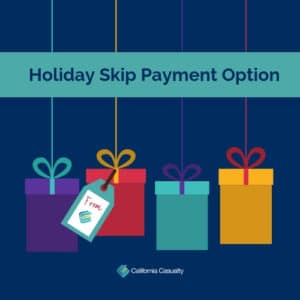by California Casualty | Auto Insurance Info |

Add a little extra peace of mind to your summer by taking advantage of the Summer Skip Payment option.
Don’t let your budget impact moments with friends or family during the summer. California Casualty helps you budget for the important things in life with the Summer Skip Payment option. You can designate the two months you’d like to free up your money during the summer months.
California Casualty’s Summer Skip is designed to allow you to enjoy fun in the sun with family and friends without worrying about your auto insurance payments.
If you are already a customer and would like to take advantage of this unique benefit, simply go online at www.calcas.com/payments to manage your account, or contact an advisor at 1.800.800.9410.
If you’re not a customer but would like to learn more about the skip payment option and all of the other special benefits available to Educators, Firefighters, Law Enforcement Officers and Nurses, request a quote today in the Start Your Auto Quote section on the right-hand side of this page.
by California Casualty | Auto Insurance Info |
Icy roads. Traffic jams. Black ice. Snow conditions. All of these can make a parent go crazy just thinking about their teen driving in these conditions. How do you talk to your new driver about driving in the winter season? We have some easy tips to get the conversation going.
- Decrease your speed. The faster you’re going, the more room you’ll need to stop.
- Be extra careful on bridges and overpasses.
- Avoid cruise control or overdrive.
- Don’t pass snow plows – their drivers may not see you, and the roads are clearer behind them anyway!
- Turn on your lights to be more visible.
- Steer into a skid – this means if your rear wheels are going right, gently steer in that direction.
- Gently tap your brakes, if you have ABS brakes, gently apply constant pressure.
- Keep your windshield wiper fluid filled and keep your headlights clean.
These helpful ideas do not have to just be for your teen. Share with friends and family.

by California Casualty | Auto Insurance Info |
A friend or relative needs your help, their car is out of commission and they want to borrow yours for a quick errand. You like to think of yourself as nice and helpful, so of course, you say “yes”. While it may seem like a kind gesture, letting them use your car is actually putting you in a bad position.
What many people don’t realize is that auto insurance follows the vehicle, not the driver. That means when you lend your vehicle to someone, you are also lending them your coverage. While you lent your car for free, it could end up costly for you.
Here’s why; when we loan a car or truck to a friend or relative, that’s called permissive use. If you have “broad protection insurance” they are covered by your vehicle’s insurance policy. While most accidents will be covered, you could be liable if people are seriously hurt in the accident and the medical and other expenses are more than you are insured for. Those injured parties could sue you for medical costs, time lost from work and property damage.
Yep, you weren’t driving, but because the accident involved your vehicle you will have to:
- Contact your insurance company
- File a claim
- Pay any deductibles
- Cover expenses beyond your insurance limits
- Prepare for a probable rate hike resulting from the accident
Here’s something to keep in mind: a permissive operator is a person who does not reside in your household, is not listed on the policy as a household member, and is operating the vehicle with your permission. A crash caused by a permissive operator will most likely be covered.
However – and this is very important – if you have named an excluded driver on the policy, insurance will not pay for damages caused in a crash by the excluded driver, even if they were using your car or truck in an emergency. So, before you let someone else use your vehicle:
- Check that they have a valid driver’s license and insurance
- Make sure your insurance policy will cover them if they have an accident
- Contact your insurance company for a policy review and that you have adequate and broad protection
- Be ready to accept the consequences if they cause a crash
This article is furnished by California Casualty, providing auto and home insurance to educators, law enforcement officers, firefighters, and nurses. Get a quote at 1.866.704.8614 or www.calcas.com.
by California Casualty | Auto Insurance Info |
 Make the holidays more jolly for your wallet by taking advantage of the Holiday Skip Payment option.
Make the holidays more jolly for your wallet by taking advantage of the Holiday Skip Payment option.
Don’t let your budget impact your family moments. California Casualty helps you budget for the important things in life with the Holiday Skip Payment option. You can designate the two months you’d like to free up your money during the holidays.
California Casualty’s Holiday Skip is designed to allow you enjoy the spirit of the season with family and friends without worrying about your auto insurance payments.
If you are already a customer and would like to take advantage of this unique benefit, simply go online at www.calcas.com/payments to manage your account, or contact an advisor at 1.800.800.9410.
If you’re not a customer but would like to learn more about the skip payment option and all of the other special benefits available to Educators, Firefighters, Law Enforcement Officers and Nurses, request a quote today in the Start Your Auto Quote section on the right-hand side of this page.
by California Casualty | Auto Insurance Info |
Accidents happen. You may or may not know what to do, and what not to do, if you are involved in a crash.
After the screeching of tires and crunching of metal is over, the first thing is to make sure everyone is okay. Then it’s time to deal with the other driver, see if there are any witnesses, and exchange information – but you are rattled, upset and maybe not thinking clearly.
Here are key things that you should do:
- Get the name, phone number and insurance policy number of the other driver(s)
- Get the license plate numbers, year, make and model of the other vehicle(s)
- If possible, take pictures that not only show the damage but the position of the vehicles – what lanes they are in, etc.
- Get names and contact information of any witnesses
- Be observant of the actions of the others involved
- Call the nearest law enforcement agency and make a report
- Contact your insurance company as soon as possible
Things you shouldn’t do:
- Don’t admit fault or apologize
- Don’t lose control of your emotions
- Don’t let the other party take a picture of your driver’s license (the National Association of Insurance Commissioners warns that information can be used by identity thieves)
- Don’t leave the scene before you exchange information
- Don’t accept money from the other party to avoid reporting the crash to insurance
While you should report all accidents to your insurance company, law enforcement may not need to be called for a minor non-injury collision. Be sure to obtain all the pertinent information in case you decide to file a report.
The National Association of Insurance Commissioners has produced a Wreck Check safety pamphlet that every driver should carry. You can find a link from the California Casualty Resource Page, www.calcas.com/resources.
There are a few other important things our adjusters want people to know:
- Make sure to get the correct contact information and license plate of the other vehicle(s) involved
- Make sure to give your best contact number or email to help speed up their claim
- Make sure to report any hit-and-run crashes to law enforcement and provide as much information as possible
by California Casualty | Auto Insurance Info |
Great educators can have a lifelong impact on their students. As they challenge and encourage the learning process, they also guide them on the path to future success.
They don’t do it alone. Creating a learning environment for all students requires the combined efforts of schools, administrators, teachers and professional support staff.
Those who succeed have a passion for pushing students to reach new heights. They don’t do it for glory or adulation; they do it because they can make a difference in a child’s life. Working in education is more than just a job; it’s a calling.
That devotion is exhibited by Palm Springs Painted Hills Middle School music-band and choir instructor Brian McDaniel, California’s 2018 National Teacher of the Year nominee. He believes that, “An outstanding teacher is a force of nature, an earthquake looking for every opportunity to burst through the surface and change the world. The power of an outstanding teacher can generate countless aftershocks long after they’ve passed on.”
McDaniel’s colleagues and students say he motivates and inspires everyone he meets. He overcame being homeless and in foster care early in life through music. His belief in the power of music to heal has been embraced by students, and their performances routinely win awards.
California Casualty values the contributions of educators like Mr. McDaniel.
As the Presenting Sponsor of the California School Recognition Program, California Casualty is proud to make possible the events that honor the 2018 California Teachers of the Year, Classified Employees of the year, and the public schools named as Distinguished Schools. From the many years that we have been visiting classrooms and listening to educators, we’ve learned that every person or school that is recognized represents dozens more that are doing great things for students, staff and their communities.
With a relationship that spans 66 years, CTA and California Casualty are mutually committed supporting educators in their goal of improving the learning environment. We understand that great teachers don’t accomplish great things by themselves. That’s why California Casualty and CTA are sponsors of the California School Recognition Program.
California Casualty CEO Beau Brown said it best when he remarked, “Our partnerships with CTA and the California Department of Education is a testament of how schools, businesses and communities can come together to promote the remarkable successes of those developing the minds of our future generations.”
California Casualty supports educators in other meaningful ways with programs that have real impact on their lives. These include $7,500 School Lounge Makeovers; California Casualty Thomas R. Brown Athletics Grants; Impact Teen Drivers “Create Real Impact” contest that works to end distracted driving crashes – the number one killer of teens today; and $250 Help Your Classroom grants.
We thank everyone involved with education that makes a difference every day.

California Superintendent of Public Instruction with California Casualty AVP Lisa Almeida, Field Marketing Manager Amanda Keidel and CEO Beau Brown at 2017 Teachers of the Year Ceremony



 Make the holidays more jolly for your wallet by taking advantage of the Holiday Skip Payment option.
Make the holidays more jolly for your wallet by taking advantage of the Holiday Skip Payment option.